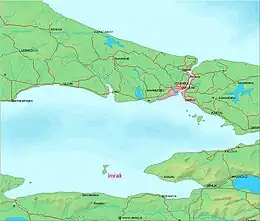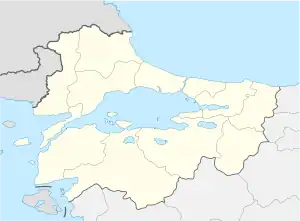 Satellite image of İmralı island in Turkey. | |
 | |
 İmralı Location of İmralı within Marmara Region  İmralı Location of İmralı within Turkey | |
| Geography | |
|---|---|
| Location | Sea of Marmara |
| Coordinates | 40°32′15″N 28°32′06″E / 40.53750°N 28.53500°E |
| Area | 9.98 km2 (3.85 sq mi) |
| Coastline | 19.4 km (12.05 mi) |
| Highest elevation | 217 m (712 ft) |
| Highest point | Türk Tepesi |
| Administration | |
Turkey | |
| Region | Marmara Region |
| Province | Bursa Province |
İmralı is a small Turkish prison island in the south of the Sea of Marmara, west of the Armutlu-Bozburun peninsula within Bursa Province. It measures 8 kilometres (5 miles) in the north–south direction with a width of 3 kilometres (2 miles), and has an area of 9.98 square kilometres (3.85 sq mi). The highest peak is Türk Tepesi at an altitude of 217 metres (712 feet) above sea level. It is prohibited to fly over it or fish near its shores.
History
The Roman authors Pliny the Elder and Strabo called the island Besbicus (Ancient Greek: Βέσβικος).[1] It was later known as Kalonymos (Greek: Καλώνυμος) and Kalolimnos (Greek: Καλόλιμνος). In antiquity, it was a member of the Delian League since it appears in tribute records of Athens between 434/3 and 418/7 BCE.[2]
The Turkish name İmralı derives from the name of the island's conqueror, Emir Ali, one of the first Ottoman admirals. In 1308 İmralı became the first island to be conquered by the newly established Ottoman Navy. Its strategic location enabled the Ottomans to control the movement of ships in the Sea of Marmara with a naval base established on it, cutting the Byzantine Empire's connection to Bursa. The island is also referred as "Mir Ali" in Ottoman documents. The island was also a place of refuge for the runaways of the Devshirme System. For example in 1567, a group of runaways was protected and hidden by the locals of Mir Ali Island while the batches of children were being transported from the port of Dutlimanı in Bandırma.[3]
In 1913, the island had 250 houses, a school, three monasteries, and 1,200 residents, all of whom were Greeks. The economic activity of the island's residents consisted mainly of fishing and farming onions, with most of the grown onions sold to Istanbul. There were three Greek villages on the island, engaged mostly in growing grapes, winemaking, silk production and fishing, until the Turkish War of Independence (1919–1923). One well-known islander was Kimon Friar who emigrated to the United States and became a scholar and translator of Greek language poetry.[4] The island was depopulated by the 1923 forced population exchange between Greece and Turkey and remained uninhabited for thirteen years.
In 1936, the Turkish government opened a newly semi-open prison.[5] where the prisoners earned money by working in agriculture and fishing. Following the 1960 Turkish coup d'état, the deposed Prime Minister Adnan Menderes was imprisoned, tortured, and executed on the island.[6] From 1999 until 2009, the now-maximum-security prison housed a single inmate, Abdullah Öcalan the leader of the PKK.[7] and all the other prisoners on the island had been transferred to mainland Turkey.[8] In November 2009, several other prisoners were transferred to a newly constructed building.
There is now a military base on the island and the surrounding area is a forbidden zone.
References
- ↑ Sir William Smith, ed. Dictionary of Greek and Roman Geography, vol. 1 (London: John Murray, 1872) p. 395.
- ↑ Mogens Herman Hansen & Thomas Heine Nielsen (2004). An inventory of archaic and classical poleis. New York: Oxford University Press. p. 978. ISBN 0-19-814099-1.
- ↑ Yılmaz, Gülay (1 December 2015). "The Devshirme System and the Levied Children of Bursa in 1603-4". Belleten (in Turkish). 79 (286): 901–930. doi:10.37879/belleten.2015.901. ISSN 0041-4255.
- ↑ American College of Greece Archived 13 October 2007 at the Wayback Machine
- ↑ Sipahi, Ali (2016). "Convict Labor in Turkey, 1936-1953: A Capitalist Corporation in the State?". International Labor and Working-Class History (90): 246. ISSN 0147-5479. JSTOR 43956708 – via JSTOR.
- ↑ "May 27: A dark military coup in Turkey". TRT World. Turkish Radio and Television Corporation. Retrieved 2 August 2023.
- ↑ "PKK leader Ocalan gets company in prison". United Press International. 17 November 2009. Retrieved 9 June 2021.
- ↑ King, Laura (1 March 1999). "Ocalan Affecting Turkish Town". Associated Press. Retrieved 9 June 2021.
Sources
- (in Turkish) Brief history Archived 8 December 2012 at archive.today
- (in Turkish) On the island
- (in Turkish) Brief history
- (in Turkish) About the name of the island